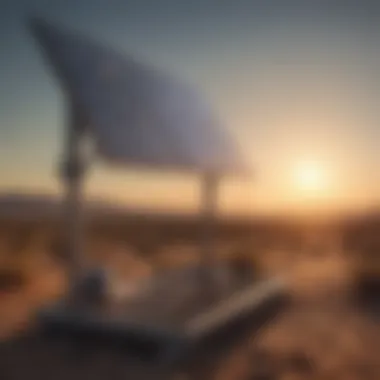Exploring Solar Energy's Worth: Reddit Insights Revealed


Finale
The critical evaluation of solar energy via the conversations of Reddit users reveals invaluable insights into its viability. Personal narratives highlight financial metrics, nuanced challenges, and a collective hope toward future advancement.
Engaging with this material allows potential buyers and informed policymakers to make data-driven choices. Discussions reflect realities beyond the indices and reports typically associated with solar. Broader perspectives capture the organic narrative of transitioning to a sustainable future, elucidating complexities and celebrating successes. Comprehensive guidance for navigating the solar marketplace begins here with shared insights and experiences.
Intro to Solar Energy Utilization
Solar energy has merited significant attention in recent years. This surge is due to rising environmental concerns and a quest for renewable energy sources. Understanding how solar power can be utilized is crucial for informed discussions.
Given the urgency of addressing climate change, investing in solar systems offers substantial benefits. It is a versatile energy source that reduces reliance on fossil fuels. Moreover, solar technology has advanced, making it more efficient and accessible to various types of users.
This section will elaborate on two key aspects that reinforce the case for solar energy. They are:
- The growing popularity of solar power allows a wide array of users to benefit.
- A fundamental understanding of how solar technology functions enables more effective adoption.
By exploring these themes, readers can better understand the strategic importance of solar energy in transitioning toward sustainable energy solutions.
The Growing Popularity of Solar Power
The market for solar power is constantly expanding. Statistics indicate a notable shift in energy production practices. This leads to growing public interest and investment in solar energy systems. Individuals from many backgrounds initiate their solar journeys. This includes homeowners, small business owners, and even tech enthusiasts.
Key Drivers of Popularity Include:
- Rising Energy Costs: As traditional energy prices escalate, solar power emerges as a practical long-term solution.
- Awareness of Climate Change: Many individuals now recognize their responsibility in protecting the environment, prompting greater adoption of renewable sources.
- Technological Advances: Improved solar technology has resulted in higher efficiency rates, reduced costs, and less space required for installation.
This growing popularity is not limited just to private individuals. Moreover, large-scale solar farms are emerging across different sectors, affecting energy dynamics significantly. For instance, sectors like agriculture and manufacturing explore options for augmentation of their energy sources via solar energy.
Understanding the Basics of Solar Technology
To maximize the benefits of solar energy, it is essential to grasp the foundational aspects of solar technology. Solar energy functions through the conversion of sunlight into usable energy. This process predominantly occurs via photovoltaic (PV) panels.
Key Components of Solar Technology
- Solar Panels: They capture sunlight and convert it into electricity. This is done using semiconductor materials regulated with substances like silicon.
- Inverters: They translate the direct current (DC) generated by the panels into alternating current (AC), making it usable for individuals.
- Battery Storage (Optional): While not mandatory, battery setups store excess energy that can be utilized during low-light conditions or nighttime.
- Mounting Systems: These are crucial for proper installation of solar panels on rooftops or ground installations. The positioning ensures optimum sun exposure.
While investigating the viability of solar energy, comprehending these elements provides clearer insight. Knowledge of how the system operates informs users about its functionality, potential costs, and expected benefits, enhancing the case for investment in sustainable energy sources.
The Financial Aspect of Solar Investment
The financial aspect of solar investment plays a critical role in shaping the decision of individuals and businesses considering solar energy as a viable alternative. Understanding these financial components is essential, as it directly impacts the overall appeal and affordability of solar solutions. Engaging in discussions around the financial implications can guide users toward making informed choices based on their economic situations and objectives.
Initial System Costs and Considerations
When considering solar energy, the initial system costs are often the foremost concern for potential investors. These costs encompass the price of solar panels, inverters, installation labor, and auxiliary components necessary for a functional system. Generally, prices for solar panel systems have declined over the years, making them more accessible. However, upfront investment remains considerable, often ranging into thousands of dollars. This creates an apprehension among potential users.
Before making a purchase, one should also consider the quality of the solar products. Investing in reputable brands, like SunPower or LG, often results in higher durability and efficiency, albeit at a premium. This tradeoff between cost and reliability is a focal point in many user discussions on platforms like Reddit, where both frugality and sustainability are frequently debated.


Giving careful thought to the location, as well as the energy consumption patterns of a site, may further influence the system size required and thus the overall cost. Therefore, planning adequately ensures that initial investments lead to optimized energy savings in the future.
Government Incentives and Tax Breaks
A significant aspect contributing to the financial viability of solar energy investment comes from government incentives and tax breaks. Numerous regions offer incentives to stimulate solar adoption, which can greatly alleviate the financial burden. For example, federal tax credits for eligible solar installations in the United States allow homeowners to deduct a percentage of their solar costs from their federal taxes.
In addition to federal credits, many states roll out their programs to provide vouchers or rebates tailored specifically for solar check setups. These initiatives can further decrease net costs considerably. Community members often highlight these as vital factors influencing their choices on Reddit discussions. Engaging with this information can certainly enable potential investors to take full advantage of available offers.
Long-Term Savings on Energy Bills
One of the most compelling reasons to invest in solar energy lies in the potential long-term savings on monthly energy bills. Numerous users share their experiences regarding how solar systems begin to show significant payoff after about five to seven years. Depending on energy usage and local electricity prices, these savings can lead to a complete cycle back to the investment outlay. Such a long-term view encourages many to explore solar, understanding that despite initial costs, prolonged savings often lead to the break-even point much sooner than expected.
Moreover, discussions on Reddit reveal users detailing their positive experiences with lowered energy costs. Many find the consistent decrease in their monthly utility bills quite worthwhile. Some homeowners even find extra surplus energy, leading them to sell credits back to the grid through net metering arrangements.
Resale Value Impact on Property
Investing in solar energy systems often correlates positively with the resale value of properties. Homes with solar installations can exhibit higher demand among buyers. User experiences on platforms like Reddit feature these discussed themes, where homeowners mention their delight in seeing increased interest when selling property.
Real estate studies further affirm this trend. Research shows that properties with solar panel systems usually sell faster and for higher prices than those without. Financial considerations reflect how solar adoption can be a significant upgrade, enhancing property appeal while driving up property valuations substantially.
User Experiences Shared on Reddit
Exploring user experiences on Reddit offers valuable insights into how solar energy resonates with real individuals. This part is significant because it gives a voice to those engaging with solar technology. The firsthand accounts expand upon the theory behind solar energy, underpinning it with real-life applicability. Looking at user testimonials, triumphs, and the obstacles they faced creates a multi-dimensional picture of the solar landscape in contemporary society.
To gather diverse viewpoints, Reddit forums touch on several pertinent aspects of solar energy. The emotions and contexts surrounding an individual's decision to invest can vary enormously. Diving into these experiences allows for a clearer assessment of solar as both an energy solution and investment.
Positive Testimonials and Success Stories
The positivity found in testimonials and success stories illuminates the potential outcomes of solar energy adoption. Users often share altered perspective towards relyinbg on renewable energy. Their posts highlight tangible benefits, including significant reduction in energy bills, and increased property value over time. Instances abound where users describe their enthusiasm for inducing sustainability into their daily routine, contribute good to the planet, or even time saved on dealing with suppliers.
Here are some common themes seen in positive anecdotes:
- Improved Energy Independence: Many users have reported a significant decrease in reliance on traditional energy sources due to solar setups.
- Environmentally Friendly Stance: Contributors often emphasize pride in making green choices, thus enhancing eco-friendly lifestyles.
- ROI and financing options: Many find that financing plans can make installments more manageable.
Essentially, these narratives serve to encourage interested individuals to invest aligned with the success others have experienced. Such community sharing creates a sense of legitimacy around solar technology.
Common Challenges Faced by Users
Just as vital as sharing successes are discussions surrounding challenges and pitfalls in solar adoption. No investment remains seamless, and Reddit users elucidate problems ranging from installation complaints to the initial complexities of understanding a system's operational demands. Armed with these challenges, potential investors can better prepare for what lies ahead.
Important areas of concern include:
- Installation Issues: Some users report scheduling conflicts or installation errors that plagued the first few months of solar utilization.
- Technical Troubles: Mechanisms sometimes fail or result may vary. Technical articles align to highlight user device issues distinctively appear online.
- Regulatory Navigation: Users frequently cite cumbersome processes to secure permits or incentive funding, demanding attention from intending investors.
Addressing these challenges head-on breeds transparency in discussions. This acknowledgment also affirms users must engage proactively if momentary hurdles will arise.
Barriers to Adoption Noted by the Community


Communities note barriers that slow the adoption of solar energy. These barriers can reflect broader societal trends and hurdles consumers experience through systemic roadblocks. As a summary of varied user narratives illustrates, the problems are not always individual-based. Overall insights reflect cost misalignment, lack of understanding, or regional disparities.
Common barriers include:
- Upfront Costs: Many individuals are deterred by initial investment figures. The high costs seem prohibitive for a wide base of budget-conscious people.
- Limited Technical Knowledge: A significant portion of users confessed to feeling overwhelmed by product jargons and options. Addressing education is necessary for assisting their decisions.
- Trust Deficit in Service Providers: Reports of negative experiences push apprehension from first-time buyers, casting doubt on service quality or reliability.
Engaging with these elements ensures users become well-informed on potential lag times as they move forward.
In summary, Reddit alludes to more than just scientific data behind adopting solar. Individual narratives paint vivid pictures of varied continuous paths they lead users through. The interplay between positive experiences, stumbling blocks, and barriers to effective adoption amplifies the understanding needed for buyers to finalize their investment decisions.
Environmental Considerations
The discussion around solar energy often brings focus to its environmental implications. How solar energy benefits nature and the concerns it raises play a crucial role in understanding its viability as a sustainable energy source. Various Reddit discussions shed light on user beliefs as they evaluate solar energy's ecological consequences. This section delves into key factors such as the impact on carbon footprint and the management of solar panels at the end of their lifecycle.
Overall Impact on Carbon Footprint
One of the primary benefits of solar energy is its potential to reduce carbon emissions. Users in Reddit threads frequently highlight this aspect, emphasizing its role in combatting climate change. Solar panels generate electricity without emitting greenhouse gases, making them a cleaner option compared to fossil fuels. It is noted that adopting solar can contribute to significant reductions in a household's carbon footprint over time.
- The average home using solar panels often sees a decrease in annual emissions equivalent to that of planting several trees.
- Shifting to solar helps limit reliance on traditional energy sources, which are significant contributors to air pollution in many areas.
Naturally, the exact environmental benefits can depend on various factors, like the types of panels used and installation practices. Nonetheless, many users see solar energy as a preferable choice, advocating for its adoption as part of a greener lifestyle. This insight fetched from user interactions provides a practical metaphor not just for homeowners but urban planners too.
"Switching to solar dramatically changed our energy usage. It feels as if our family is making a direct contribution to the young planet!" – Reddit user
End-of-Life Management of Solar Panels
Despite solar energy's benefits, its panels eventually reach end-of-life, sparking a new debate regarding aggregate waste. Users on Reddit raise concerns about recycling and disposal methods of these panels. It is imperative to think carefully about how these materials will be managed to avoid harm to the environment. Already, some manufacturers and collective efforts are underway to ensure the recycling or repurposing of used panels.
- A vital aspect of solar panel management addresses material recovery and disposal processes. This is necessary not just to reduce landfill waste but also to recover valuable materials, such as silicon, which can be reused.
- While many older panels can last up to 25 years, the desire for newer technology can lead to premature removal, underlining the need for proper recycling enterprises.
Through community discussions, users underscore the importance of supporting policies—like extended producer responsibility— that reinforce sustainable lifecycle practices.
As conversations with users on platforms demonstrate, understanding the future impact of solar energy goes far beyond production. Significant includes continuous advancements in recycling methodologies as part of a holistic view of sustainability in energy practices.
Comparative Analysis with Other Energy Sources
The comparative analysis of solar energy with other energy sources holds significant value in determining its feasibility as a sustainable option. Understanding how solar energy stacks up against traditional and renewable alternatives is crucial for potential investors and the general public concerned about the environment and energy costs. Engaging in this assessment offers insights into efficiency, costs, environmental impacts, and the long-term sustainability of each energy source. Such awareness empowers stakeholders to make informed decisions regarding energy investments and policies.
Efficacy Compared to Fossil Fuels
When analyzing the efficacy of solar energy against fossil fuels, various factors must be considered. Solar energy offers a clean alternative to coal, natural gas, and oil, which contribute significantly to greenhouse gas emissions. According to estimates, if solar utilization was maximized globally, it could mitigate approximately 3 billion metric tons of carbon dioxide annually.
The operational maintenance of solar panels is also comparatively less rigorous than that required in fossil fuel extraction, thus presenting less risk of environmental damage through spills or emissions.
Key Points:
- Efficiency Rate: Solar panels usually have an efficiency rate of around 20% to 22%, while fossil fuels convert about 35% to 45% of their potential energy into usable electric energy.
- Cost Trends: The levelized cost of solar has steadily declined, making it increasingly competitive. The declining price of solar technology makes it parallel economically to coal and natural gas.
- Sustainability: Solar energy's renewability implies an unlimited supply as long as the sun shines, while fossil fuels can dimly provide energy limited to availability and extraction costs.


In light of these points, it remains significant that while the infrastructure to harness fossil fuels is established, the movement forcing solar energy into mainstream operation is gathering momentum due to public preference shifting towards cleaner energy options.
Comparison with Wind Energy Solutions
When standing next to solar, wind energy emerges as another pillar of renewable energy. While their functionalities may differ in harnessing nature's power, focusing on specific factors can reveal their interoperability. Solar and wind energy excels when evaluated on capacity factors and land use efficiency.
Capacity Factor: Typically, wind energy boasts capacity factors ranging from 35% to 45%, while the solar range is generally around 15% to 25%. Note that effectively, solar energy production is lower in circumstances of rainy weather or shorter days during winter. Harnessing complementary sun and wind energy could elevate the efficiency of a national energy grid altogether.
Space Requirements: Solar energy installations can be mounted on rooftops and available land across urban environments efficiently. Comparatively, wind turbines require designated land usage, sometimes adversely affecting landscapes or local habitats. This aspect also lends positively to solar concerning residential adoption.
In assessing the total effectiveness of solar versus wind, it's crucial to recognize they can amplify each other's strengths, leading to a balanced and reliable renewable energy portfolio.
Future Trends in Solar Energy
Exploring future trends in solar energy is paramount in understanding not just the technology itself, but also how it can integrate with broader energy infrastructures. This section delves into key advancements that are likely to affect how we perceive and adopt solar power.
Technological Advancements in Solar Panels
New technologies are significantly shaping solar panels’ future effectiveness. Emerging innovations are promising to improve efficiency, durability, and sustainability. For instance, perovskite solar cells are gaining attention due to their potential for lower production costs and higher efficiency rates than traditional silicon-based solar panels.
Additionally, bifacial panels, which can capture sunlight on both sides, enable a higher electricity yield. This technology harnesses reflected sunlight, making it more efficient in various installation environments.
Another trend is the integration of solar panels with smart technology. Developers are focusing on solar panels that can communicate with the energy grid. This interconnectivity can enhance energy management, allowing users to sell excess energy back to the grid or use energy from the grid more effectively based on demand.
Moreover, organic photovoltaics could lead to lightweight and flexible solar panels. Such designs open the door to various applications on different types of surfaces imaginably in both urban and rural areas. These enduring innovations may reduce initial costs and improve ROI, vital elements called out from user discussions on platforms like Reddit.
The Evolving Market Landscape
The solar energy market is undergoing transformations driven by technological advancements and social demand trends. Public enthusiasm for renewable energies has made solar solutions a more compelling choice daily.
More businesses and homeowners are recognizing the long-term benefits and stability achievable through solar installations. Various manufacturers are entering the market, accelerating competition. This influx of players often results in more products at competitive prices, pushing the conversation around solar solutions into mainstream buying decisions.
Investment in battery storage technologies is also becoming vital within solar energy discussions. Improved energy storage can counteract the intermittency issues traditionally associated with solar power production. This means consumers can source energy from their systems even when sunlight is not directly available. Indeed, enhanced battery lifetime looks promising, affecting overall solar energy self-sufficiency.
As the solar energy market evolves, users are likely to witness an increased variety of financing plans tailored to democratize access to solar energy solutions. With supportive remarks from users in their discussions, innovative repayment plans are levelling the financial playing field for both homeowners and businesses eager to transition to cleaner energy sources.
The transition toward sustainable energy, particularly solar power, represents not just technological evolution but also a shift in societal priorities.
In an interconnected world where climate impact is ever more pressing, staying abreast of these trends in solar energy becomes essential. The interplay between new advancements and market shifts defines the pathway for its growth, shaping informed decisions for potential investors and solar energy enthusiasts.
Finale: Is Solar Energy Worth It?
Evaluating the viability of solar energy through the lens of discussions from Reddit yields essential perspectives for potential investors. Understanding whether solar energy systems are worth the investment necessitates an analysis of user experiences, costs, and benefits. This conclusion synthesizes those elements while addressing specific considerations that influence the decision-making process.
Synthesis of Insights from User Experiences
The collective experiences shared by users on platforms like Reddit provide a real-world perspective that is often missing from traditional analyses. Many users express satisfaction with their solar energy systems, highlighting significant reductions in their electricity bills as a primary benefit. They report an average savings that can reach 50% or more, depending on regional energy costs and system efficiency. Recycling solar energy into everyday consumption can augment financial allocations for other priorities, thus improving overall household or business budgets.
However, not all feedback reflects purely positive outcomes. Users commonly mention challenges such as installation costs and maintenance picky it may incurr. Reports discuss the stress of upfront financial obligations, complicating immediate cost-benefit assessments. Additionally, not all regions provide equal sunlight access, leading to disparities in efficiency and output. Review threads often feature individuals encouraging thorough assessments of local conditions before making a purchase. Moreover, several posts recommend seeking diverse quotes from installers to secure competitive rates, all reinforcing the idea that careful research and selection are paramount.
Final Thoughts for Potential Investors
For those contemplating investment in solar energy, a multilayered perspective is crucial. The financial incentives present, such as government rebates, are compelling stimuli to make these energy systems more affordable in the long run. Potential investors need to assess available tax advantages that can effectively reduce payback periods post-sale. Some Reddit users indicate that their return on investment is realized within a decade, a time frame that often feels reasonable for such a considerable infrastructure commitment.
Additionally, reducing one's carbon footprint can resonate well with environmentally conscious investors That factor often escal profitoss in the decision-making hierarchy. Further exploration into technological advancements may reveal more robust products offering higher efficiency rates over their past counterparts.







